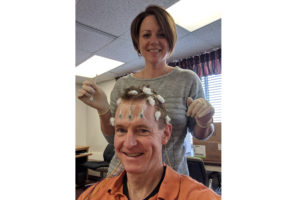Today was a clear and cool morning. As my turnaround point of my run, nearby where the ospreys fish in the river, two Canada geese swam. What made this common sighting special were the four goslings lined up between them, shifting back and forth between their herding parents. These four were my first newborn birds of this year. Is there anything cuter than a downy gosling? Well, perhaps a duckling, but they are both beautiful in their own ways.
I thought about these goslings and wondered how many of them would make it to adulthood. Though the nearby ospreys were fish eaters, there were plenty of other things in and above the water that would likely enjoy a tasty gosling for lunch. These sights and thoughts brought back memories of Ghana.
Several years ago, I worked in Kumasi, a pleasant little city. I visited the town several times over a 2 ½ year period. On the hospital’s grounds is a small noisy restaurant where, at lunchtime, the hungry line up for delicious local food. I joined the line every weekday. After a few minutes wait I reached the counter and a lovely young woman took my order. She had a voice whose volume was turned up a bit too loud. She was friendly to everyone, but I imagined she was especially kind to me. Though these were usually three or four people behind the counter dishing up food, when I reached the front, she always took care of me. Over the months, on separate trips, we came to know each other. She was curious about the United States, my family, and what I was doing in Ghana. I learned that she was married and had no children, something she and her husband had been trying for several years to change. There were no fertility specialists in Kumasi so her family was doing what they could to help her conceive. They prayed.
In Ghana, the infant mortality rate is 33.9 death per 1000 live births, six times higher than in the USA.
Eighteen months after our first meeting, I returned to Kumasi. At lunchtime my first day, I waited patiently at the restaurant to reach the front of the food line. There she was, working as hard as ever. Behind the counter she glowed, both from the heat and her pregnancy. She was far along in gestation and the baby was due in 3 months. Her joy was evident.
I returned six months later. My research project was almost completed, and this was my final visit. Shortly before noon I wandered over to the restaurant, anxious to beat the noon rush. I joined the queue, hoping she was still there, making everyone happy. Luck was with me. As I neared the counter, I saw her hard at work, feeding hungry hospital workers. Big smiles crossed both our faces when she recognized me. Almost shouting to overcome the restaurant’s noise, I greeted her and asked her how she was. She smiled and let me know she was well. “And how is the baby?”
Instantly, everything got very quiet.
“He died.”
I was aghast and overwhelmed. I was also deeply embarrassed that I had asked this question in a very public place. It was one of the many times in my life when I wished I could push Rewind.
In Ghana, the infant mortality rate is 33.9 death per 1000 live births, six times higher than in the USA. Though these statistics are daunting by themselves, I did not know anyone personally who had a newborn die shortly after birth. In the restaurant, it never occurred to me that the child of this lovely loud Ghanaian woman, might die. But, of course, in Ghana, 3% of infants succumb between 28 weeks gestation and 24 hours after birth, and another 3.4% die before their first birthday. Infant and child survival is not a given.
I am now planning a new research project in Kumasi. Hoping to return in the next few months, I have begun thinking about this young, friendly, smiling woman and my hopes for seeing her again. In our last encounter I made a bad mistake. My hope is that in the future, before speaking out, I am more sensitive to my surroundings. I have had it easy in life. Not everyone is lucky enough to have walked this same path.






